

The Myth Of AI. That mythology, in turn, has spurred a reactionary, perpetual spasm from people who are horrified by what they hear.
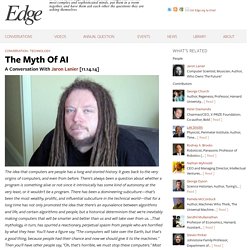
You'll have a figure say, "The computers will take over the Earth, but that's a good thing, because people had their chance and now we should give it to the machines. " At the Heart of Facebook’s Artificial Intelligence, Human Emotions. Yann LeCun, director of AI Research at Facebook, and professor of computer science at New York University.
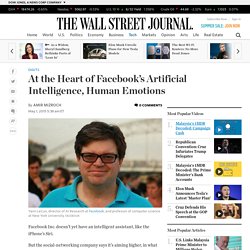
Facebook Facebook Inc. doesn’t yet have an intelligent assistant, like the iPhone’s Siri. But the social-networking company says it’s aiming higher, in what has become one of the biggest battles raging between Silicon Valley’s behemoths: How to commercialize artificial intelligence. The once-niche field is aimed at figuring out how computers can make decisions on a level approaching that of human intelligence.
Apple Inc.’s Siri, Microsoft’s Cortana and Google’s Google Now are all early manifestations. Facebook thinks it can do better. “Siri and Cortana are very scripted,” says Yann LeCun, director of artificial-intelligence research at Facebook, in an interview. Apple and Microsoft declined to comment. Facebook’s LeCun also sees promise in natural-language processing–machines understanding what is being said in speech in a more sophisticated way than Siri or Cortana. Explicit cookie consent. ELON MUSK busies himself building other people’s futures.
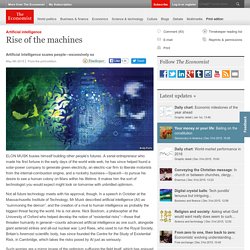
A serial entrepreneur who made his first fortune in the early days of the world wide web, he has since helped found a solar-power company to generate green electricity, an electric-car firm to liberate motorists from the internal-combustion engine, and a rocketry business—SpaceX—to pursue his desire to see a human colony on Mars within his lifetime.
It makes him the sort of technologist you would expect might look on tomorrow with unbridled optimism. Not all future technology meets with his approval, though. In a speech in October at the Massachusetts Institute of Technology, Mr Musk described artificial intelligence (AI) as “summoning the demon”, and the creation of a rival to human intelligence as probably the biggest threat facing the world. He is not alone. Such worries are a mirror image of the optimism suffusing the field itself, which has enjoyed rapid progress over the past couple of years. Deep thought. Explicit cookie consent. MARTIN FORD is worried about the robots: I've been blogging here extensively about the likelihood that various forms of automation will eventually create significant technological unemployment.
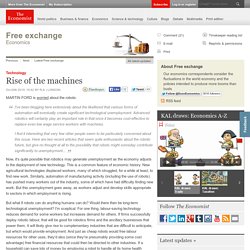
Advanced robotics will certainly play an important role in that once it becomes cost-effective to replace even low wage service workers with machines.I find it interesting that very few other people seem to be particularly concerned about this issue. Here are two recent articles that seem quite enthusiastic about the robotic future, but give no thought at all to the possibility that robots might someday contribute significantly to unemployment... Now, it's quite possible that robotics may generate unemployment as the economy adjusts to the deployment of new technology. Rise of the machines. Rise Of The Machines. Enthusiasts and Skeptics Debate Artificial Intelligence. Kurt Andersen wonders: If the Singularity is near, will it bring about global techno-Nirvana or civilizational ruin?
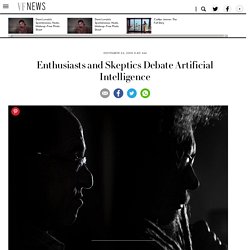
Artificial intelligence is suddenly everywhere. It’s still what the experts call “soft A.I.,” but it is proliferating like mad. We’re now accustomed to having conversations with computers: to refill a prescription, make a cable-TV-service appointment, cancel an airline reservation—or, when driving, to silently obey the instructions of the voice from the G.P.S. But until the other morning I’d never initiated an elective conversation with a talking computer. I asked the artificial-intelligence app on my iPhone how old I am. Siri appeared on my phone three years ago, a few months after the IBM supercomputer Watson beat a pair of Jeopardy!
Machines performing unimaginably complicated calculations unimaginably fast—that’s what computers have always done. Those questions might seem like the stuff of late-night dorm-room bull sessions. Joy freaked out. The Myth Of AI. That mythology, in turn, has spurred a reactionary, perpetual spasm from people who are horrified by what they hear.
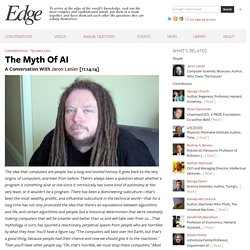
You'll have a figure say, "The computers will take over the Earth, but that's a good thing, because people had their chance and now we should give it to the machines. " Then you'll have other people say, "Oh, that's horrible, we must stop these computers. " Most recently, some of the most beloved and respected figures in the tech and science world, including Stephen Hawking and Elon Musk, have taken that position of: "Oh my God, these things are an existential threat. They must be stopped. " In the past, all kinds of different figures have proposed that this kind of thing will happen, using different terminology.
A good starting point might be the latest round of anxiety about artificial intelligence, which has been stoked by some figures who I respect tremendously, including Stephen Hawking and Elon Musk. What do I mean by AI being a fake thing? This is not one of those. Watson.